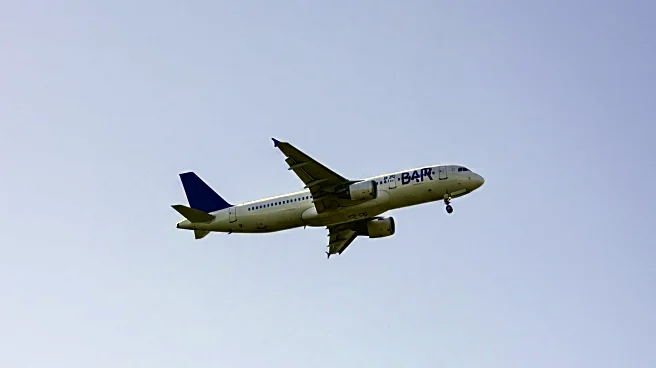What is the story about?
What's Happening?
The Airbus A320 family has overtaken the Boeing 737 as the dominant aircraft in the narrowbody market, according to recent data from Aviation Week's Tracked Aircraft Utilization database. The A320 family, which first flew in 1987, has seen its utilization share increase to over 56% in recent years, surpassing the Boeing 737, which has been a market leader since its first flight in 1967. The shift is attributed to higher delivery rates and lower retirement rates of the A320 family, which is younger compared to the 737. Airbus currently has a backlog of over 7,000 A320 aircraft, while Boeing has nearly 5,000 737s in its backlog. This trend indicates that Airbus is likely to maintain its lead in the narrowbody sector for the foreseeable future.
Why It's Important?
The dominance of the Airbus A320 family in the narrowbody market has significant implications for the aviation industry. This shift could influence airline purchasing decisions, potentially affecting Boeing's market share and financial performance. The A320's increased utilization reflects a preference for newer, more efficient aircraft, which could drive technological advancements and competitive pricing in the sector. Airlines may benefit from the A320's operational efficiencies, potentially leading to cost savings and improved service offerings. The competition between Airbus and Boeing is a critical factor in the global aerospace market, impacting supply chains, employment, and economic activity in regions where these companies operate.
What's Next?
As Airbus continues to deliver A320 aircraft at a high rate, Boeing may need to strategize on how to regain its competitive edge in the narrowbody market. This could involve accelerating the certification and delivery of its 737 MAX variants or investing in new technologies to enhance aircraft performance. Airlines will likely continue to evaluate their fleet compositions, balancing cost, efficiency, and passenger demand. The ongoing competition between Airbus and Boeing will be closely watched by industry stakeholders, including suppliers, investors, and regulatory bodies, as it shapes the future of commercial aviation.















